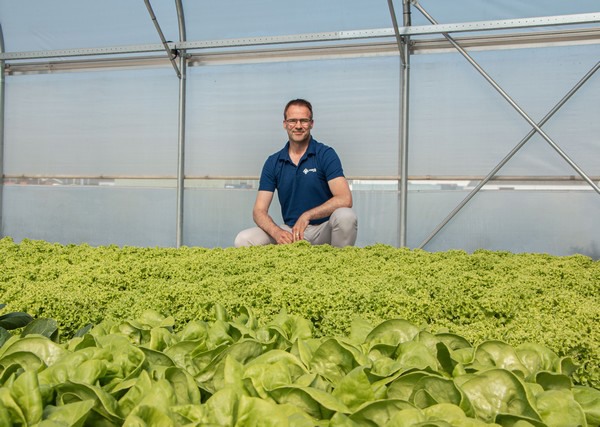Last month Maren Schoormans joined Viscon Group as Chief Business Development Officer. He started in the middle of the corona crisis, but that doesn’t stop him looking ahead in the article below in which he tackles some biases, shares his own (biased) prediction, touches on local prediction and the role of the Dutch horticultural sector in spreading this. “Let's continue to inspire and help other countries build their own local production facilities.”

“I am excited to be able to work from the heart of this company that breathes innovation. Me and the team are motivated and full of ideas, but challenging times have arrived for our industry, with immediate effects on our customers, the growers and farmers. It breaks my heart to see excellent entrepreneurs struggle.
Where is this going? I read many predictions on what the world, society and the food and agriculture business could look like after the crisis. We’re beginning to realize that we’re just at the beginning of a global economic crisis and recovery may take several years. Nobody knows what's ahead, but we need credible stories to guide us while we adjust, adapt and explore opportunities throughout the imminent recession.”
Confirmation bias
Whenever making predictions, Maren tries to beware of what’s called the confirmation bias. “Our vision is influenced by beliefs and preferences. Here’s a few examples. Microsoft and Zoom indicate online meetings are here to stay. Okay, that’s a no-brainer (but please make it 3D).
Blockchain experts tell me the crisis could tip over the existing financial system and give rise to the crypto currency. Maybe, but who really understands these phenomena?
Robot developers tell me that we will see the accelerated adoption of robotics in horticulture shortly. Eventually yes, but the technology has yet to see the ascent stage and it’s not unlikely that workers become available because of jobs that are lost in other sectors.
Vertical farmers tell me this will be the definitive age of the breakthrough of growing without daylight. I am excited about the potential and the technology, but it’s still work in progress as the business case is not solid yet, and feasibility is still mostly limited to specialty leafy crops.
Then there’s artificial intelligence. Some claim that a couple of years from now we don’t need experienced growers anymore. I love that ambition and we want to help accelerate this but be realistic for now. Running a profitable greenhouse operation takes a lot more than automatic optimal setpoints for climate and irrigation. But it’s a great start.
Eventually it will happen, and we will promote every good idea initiative that could lead to our envisioned future, because climate change is already forcing us to protect our most valuable crops.”
First bridge the chasm
But in the next couple of years, people must mind the chasm, Maren states. “There’s a gap we need to bridge. New AI and robotics are underway, but not yet able to enable limitless scalability of controlled environment agriculture. It is wise to look for the best systems and technologies that are tested and proven, team up with experienced partners and invest time and money in training staff. And while doing that, embrace innovation and help testing and improving the new technologies.
During a crisis investors search for liquidity and as a result lots of startups are left without funding, which worries me because we need all the ideas we can get to cope with tomorrow’s challenges. We must keep the innovation going and embrace technological innovations, but also keep a close watch on what is going to be embraced by consumers.
Consumer behavior has changed over the course of just weeks. Will tomorrow’s consumer, driven by the crisis and increased awareness on food and health, push our industry toward accelerated innovation of what we produce?”
Prediction
“Allow me to tell you my (probably biased) prediction”, Maren continues. “I hope that the crisis will give a final blow to mindless consumerism. The economic downturn and exuberant government spending will have a big impact on jobs, taxes, funding and people’s incomes. Many people will buy what they really need and think twice before flying 3000 miles to go shopping and skiing in the desert. And do we need a new wardrobe for every season? Own multiple cars or own a car at all?
Also, those who are lucky to be able to buy more than they need, will prefer products that are OK in many respects. Is it produced in a sustainable manner, preferably benefiting the local economy, produced under ethical practices? Is it durable, can it be upgraded or recycled?
And for fresh produce you can add the questions: ‘is it good for me?’ and ‘does it taste good?’ The share of stomach of fresh produce and plant-based foods will increase on the cost of meat and ‘empty’ carbs. Vegan and vegetarian food could become the new and delicious mainstream.
This opens tremendous opportunities for innovation and new varieties of produce, coming from a wide array of big and small, existing and new types of controlled environments.”
Local production
Which leads to the most popular prediction, according to Maren, among his colleagues and friends: the rise of local food production and as a result a decline of the acreage in the large exporting countries like The Netherlands. And if so, at what speed?
“Building significant production systems in new markets requires large investments and competent people to build and run the operations. In fresh produce chains, efficiency will remain key and importing affordable sustainably produced veg and flowers often makes more sense than local production.
The Dutch horticulture industry is the number one successful cluster, let's continue to inspire and help other countries build their own. Let’s keep our ears and eyes open, as well as the discussions in our network of friends, partner companies, ‘worthy rivals’, investors, retailers and consumer scientists. One of my mottos is ‘This is my truth, tell me yours’, which is also the name of one of the best rock albums ever.”
Team up
The world needs ideas, concludes Maren. “At Viscon, we have hundreds of ideas and we love to hear yours. We are a family of 12 brands that each have their own expertise coming from plant propagation, egg hatchery, warehousing and fresh produce logistics, industrial washing, hydroponics, tracking and tracing software, tissue culture and even concepts for retail shops and solutions for vertical farming.
Increasingly often, we combine the strengths of these companies to answer the needs of our customers and your customers. We invite companies outside our group to team up with us and create something great together. An example is our Hortimed platform that offers a total solution for medical crops, from propagation to delivery of packaged goods, including tracking and tracing. We are passionate about turning ideas into reality to continuously improve the food and flower system. Let’s connect and share fresh ideas. If we succeed bridging the gap the sky is the limit for horticulture.”
For more information:
Viscon Group
www.viscongroup.eu
Maren Schoormans
m.schoormans@viscon.eu
